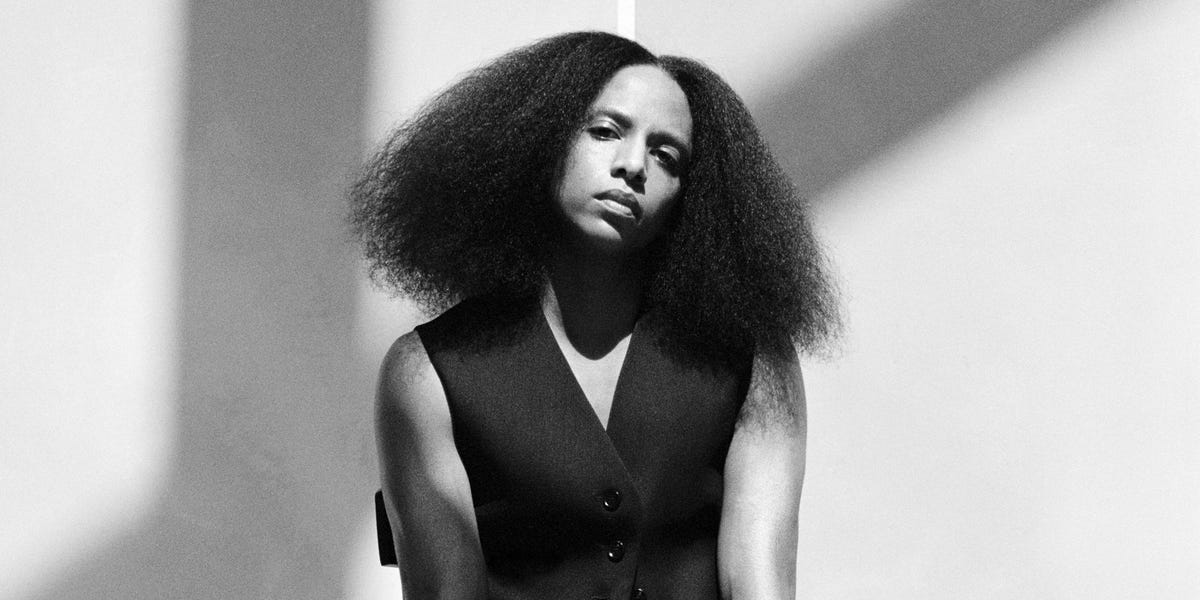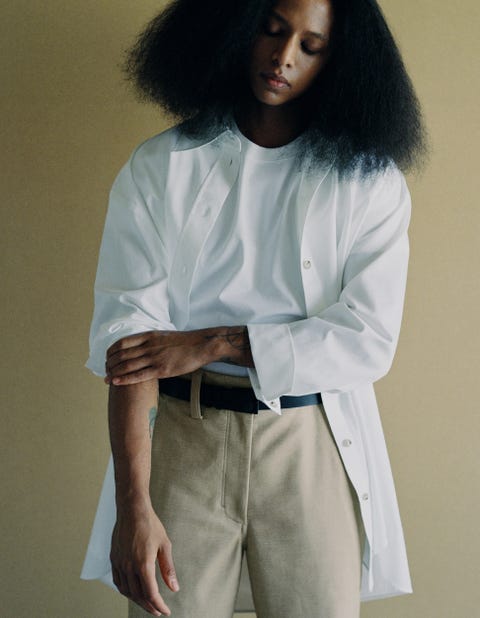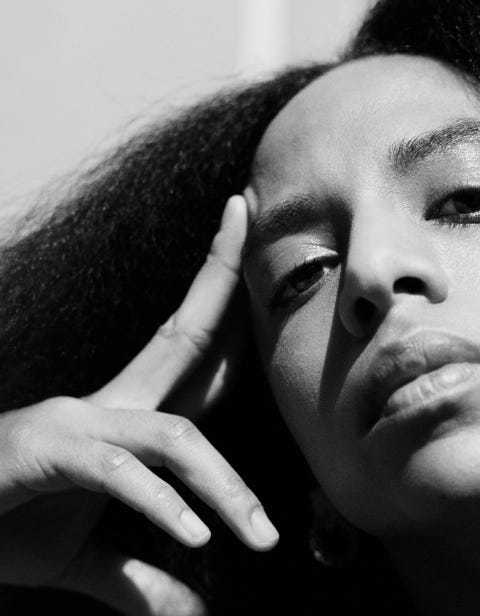Janaya Future Khan is no stranger to conflict. Their groundbreaking, boundary-shattering work on the front lines of the Black Lives Matter movement as an international ambassador has helped advance Black liberation to the masses, which comes with grief, loss, and brief moments of joy—where one can find it. They are also deeply engaged with the culture surrounding self-expression and individuality, regardless of gender and sexuality markers that were chosen at birth for them. Stepping into their own light, Khan has been able to create space for those, like them, who cannot and will not conform or adjust their appearance for the status quo.
The fashion world’s uncanny ability to shift the tides of humanity and justice has prompted Khan to engage more with it and, hopefully, use it as an agent for change. In the first of what is likely many efforts, Khan teamed up with London-based contemporary brand COS to star in its newest fall/winter 2021 campaign and runway show, as the brand strives further towards circular sustainability and timeless style over throwaway trends. The collection streamlines the everyday wardrobe: slightly oversized outerwear, tactile fabrics, slim but not suffocating shirting, and, of course, COS’ signature knitwear, using responsibly sourced mohair for the first time.
ELLE.com caught up with Khan before they walked the COS fashion show during London Fashion Week to discuss the work they’ve done with the retailer, the conflicts of sustainability and consumption, formation of identity, and how to take a beat and recharge.
How did you first become connected with COS? What has it been like to collaborate with the team?
It’s been excellent so far. I think it’s a wonderful thing when you really just enjoy not only the clothes, but the company. The collaborative energy has been fantastic. Myself and my team have pretty disciplined relationships with brands, and the idea is, what kinds of commitments can we make to each other beyond just a singular campaign? One of those things is a commitment to change, sustainability, intention, and adaptability. COS is on board and enthusiastic about what those commitments could look like, and I think that’s a rare and wonderful thing.
You’ve been vocal about sustainability in the past, and the issue of waste remains a pertinent topic in the fashion world. In what ways does COS align with your environmental values?
I’m thinking about the conversation that happened when AOC attended the Met Gala, and there was a whole hullaballoo around what is acceptable and what is not acceptable in terms of performance, shifts, and change. I think the idea that you can’t be anti-capitalist and exist in a capitalist system is really flawed logic, because no one can really truly exist outside of the society in which we live. What you can do is try to change it. I think you can do that while still being in pursuit of art and beauty, and I see fashion as an extension of art. My entire relationship to self and society changed when I understood that—how to express myself not just vocally, but aesthetically. I could take control of my own autonomy by what I put on a body that was not considered beautiful or normative. And I have had to hold the tensions of that with my desire to see brands change in terms of output or change in terms of their carbon footprint.
What I’m seeing with COS and many brands—although we know that there’s still a long way to go—is that a name is just a name, a brand is a brand. What makes it are the people that are driving the creativity, fashion, ethics, and philosophy behind it. It’s been a wonderful thing to put a face to a name, to actually meet people who are deeply committed and very concerned about consumption. It feels like everything’s possible. And I think that’s one of the hardest things to grapple with, because climate crises are happening, and are going to keep happening. Our governments simply aren’t doing what is required at the scale that it is required.
Seeing brands and people and organizations come together to push that change forward and take ownership and responsibility is a really monumental thing. I’m a big believer that culture shifts everything: it shifts Congress, it shifts politics. I’m learning more and more that life imitates art, and as long as we keep pushing the bar on what responsibility looks like, we’re going to see life continue to imitate the art that’s put out into the world. I see fashion as a huge part of that.
How did fashion shape your identity growing up?
[As a child] I didn’t make sense. My body didn’t make sense. I wasn’t considered to be a pretty girl. I sort of failed at that, and was often referred to as somebody’s son, or a boy. It’s an interesting thing to grow up understanding that you’re failing at the gender you were assigned. I understood that my body was something to hide. This is a very non-binary, trans experience, [to] roll your shoulders forward and take emphasis away from your chest. I think clothes actually are a shield at first; you find a way to mask yourself and be as unobvious as possible—to be invisible. People would look at my face and my chest trying to figure out what I was. It is a remarkable thing to be at the stage of my life where my body feels like something that I can celebrate—something that’s mine.
When we think of change, it’s always these big epiphanies. That’s how it is in movies and television: something happens, and suddenly your entire world changes. But that’s not how life works all the time. Sometimes those big changes are really small at first, and there are a series of adjustments. You decide to wear that shirt in a particular way, or you decide to wear your hair, or you decide to paint a fingernail. For queer folks, a lot of that search for authentic self happens when you step off script and realize that the story you were born into simply doesn’t make sense for you. And suddenly, that’s a powerful thing, but it can be a lonely thing too. It was art, it was fashion, it was music, and the culmination of those worlds that made me feel a lot less lonely. When I speak now, I try to speak to that human condition, that loneliness that we all feel, which is at the heart of it, of longing to be understood.
One thing that I love about fashion and about what I get to put on my body is what it’s communicating to people. We’re all feeling a little bit lonely sometimes. All we need is permission to be who we are, and if I can do that for myself, I hope that it’s enough to inspire someone else to do the same.
In your Sunday Sermons, you seamlessly interweave certain issues so they all feel connected. Where do you see fashion interconnect with culture on a bigger scale?
For about five years straight, I only wore black. It was so much easier when things just matched with everything else—I could throw things into a backpack and be on a plane or bus, because there was always a crisis happening. My job was to be where it was and help support it. If the National Guard was being called, [if] there was a curfew, if [there was] the tragedy of somebody being killed, I found myself in those places, and, even then, what I wore felt empowering. That all-black [look] felt like I was in a kind of perpetual mourning, but there was also power in the concept of a uniform. It was the utility of it, the literal ability to throw it all together and leave. I paid a lot of attention to things like asymmetrical cuts, texture, and layering. It mattered to me even before it was on the forefront of my mind. If things were going to be especially tense, I knew to wear leather. In certain moments, you absolutely would not wear mesh, and face coverings were important even before this pandemic for lots of different reasons. So much of how I relate to fashion and my expression is connected to activism and utility.
Now, in this moment where everyone feels stifled and stuck and disillusioned due to the pandemic, I found myself drawn to color for the first time in many, many years. Not just a blue or green, but a vibrant green, a ceremonial orange, a demanding silver. My wardrobe has shifted to meet me in that place. I was in this moment of difficulty, and fashion became this creative embrace, this possibility. Now, every time I put on something very colorful, I’m reminded of wearing that possibility. I hope to literally, viscerally brighten someone’s day.
I also want to collaborate with art makers and tastemakers to push the agenda toward more ethical production. It’s been a wonderful experience to meet activists and storytellers behind the scenes who are just as committed to shifting culture and shifting consumption, while still making clear the tensions between accessibility and consumption. We’re seeing so many brands recycle and upcycle materials—even the recent investment in digitized fashion. It’s a really wonderful moment to be alive.
In Michaela Coel’s Emmys acceptance speech, she said, “Do not be afraid to disappear.” Being in the public eye and doing the important work that you do, how do you give yourself time to reboot and recharge?
That’s a wonderful question. There is endless pressure to produce, and if you don’t produce, you lose relevancy, and if you lose relevancy, do you even exist? Social media really fuels that belief: the romanticizing of other people’s lives. My relationship to social media first and foremost is: can I be useful in this moment? I like to see if other people are talking about a thing first. I try to come in when I feel like something is missed. I also go on sabbatical. Incubation is so important for creativity. It’s so important to have something to say instead of the instant coffee politics of exchanging words online.
For the sake of it, right?
Right. I’m someone who is actually very good at stepping away, but I’m human. Like anything else, social media is curated, and it’s not by our hand. It’s a story that is being written by other people, by algorithms. I am most interested in people developing their own voice and their own thoughts and that sort of critical engagement. What do you really think about something? How much of what you believe or know about anything is yours? I believe that social media actually plays an important function, particularly around access. But there’s something to be said for finding the right balance and having a relationship to it that is not informed by this anxiety for production and relevance. Whatever you have to say is enough on its own. The world could really use more of us speaking up and thinking hard about what it is that we want to say.
This interview has been lightly edited and condensed for clarity.
This content is created and maintained by a third party, and imported onto this page to help users provide their email addresses. You may be able to find more information about this and similar content at piano.io


